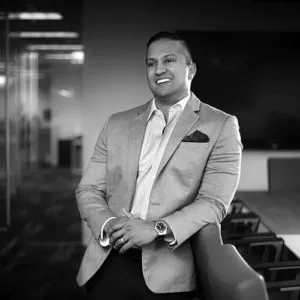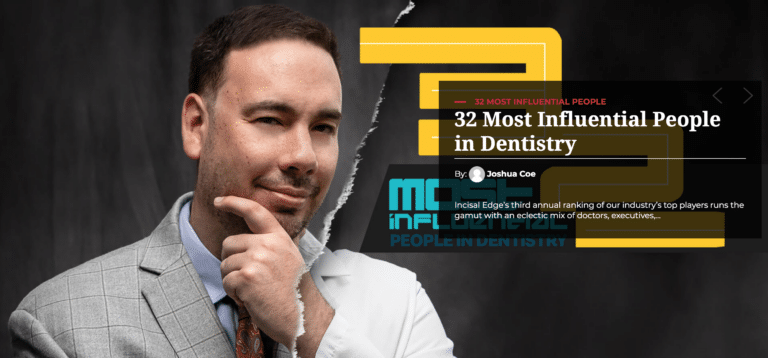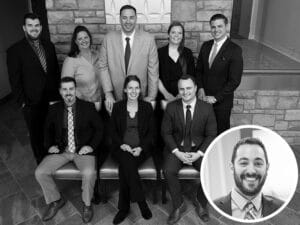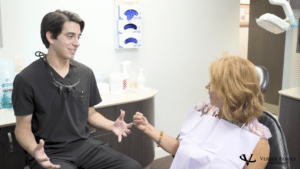The Verber Dental Group was honored to be ranked second out of 32 top players in the dental industry. We were ranked as the entrepreneurial dentist and the office was showcased in the magazine. Dr. Verber was also chosen to be on the cover of the magazine. The article goes further into our business model, upcoming plans and what our future endgame looks like. For an office that started as a single doctor location in a small house located in downtown Mechanicsburg, Pennsylvania, this is a huge accomplishment and recognition. Below is the full article:
#2
the entrepreneurial dentist
The Doctor IS in Business
The classic solo-practice model that has been dentistry’s lodestar for decades is less prevalent than it used to be. In recent years, a host of entrepreneurially inclined doctors have established hybrid practices that are neither fish nor fowl: not solo, not DSO, not fully corporate. How’s business? Worth a closer look, certainly.
By Joshua Coe
The classic solo-practice model that has been dentistry’s lodestar for decades is less prevalent than it used to be. In recent years, a host of entrepreneurially inclined doctors have established hybrid practices that are neither fish nor fowl: not solo, not DSO, not fully corporate. How’s business? Worth a closer look, certainly.
IT IS PERHAPS stretching credulity like a distended ortho rubber band to say that dentists could learn a lot from the 2016 movie “The Founder,” which told the story of Ray Kroc (played by Michael
Keaton), who built McDonald’s from a very modest California burger chain into a global behemoth. What on earth do dentistry and fast-food burgers have in common?
The difference with us: Because we’re the owners making the final decisions and seeing the patients, we can keep patient care first.”
—Dr. Michael Verber
Mastication, for one. But the business side of “The Founder” is of interest: the challenges of scaling up, the pros and cons of franchising, making a profit. Those notions have greater salience today, when the small solo-practice dental model of the popular imagination is changing,
giving way to a mixture of dental service organizations (DSOs) and corporate entities offering economies of scale, perhaps at the cost of personalized patient care.
Today, only about half of dentists are in solo practice, according to the American Dental Association’s Health Policy Institute, down from 65 percent in 1999. In contrast is the rising DSO model, in which a company like Aspen Dental (see No. 10) acts as a support system, providing dentists with space, staff, training and even marketing. With the business worries elsewhere, in theory, the dentist can focus on patient care.
Sounds good—but it’s too restrictive a model, says Dr. Michael Verber, 43, a dentist in Camp Hill, Pennsylvania. “Corporate owns the practice,” he says, noting that even if the doctor has a share of the parent company, it’s not usually a voting stake.
Another prominent DSO, Heartland Dental, is the country’s largest, with 900 “supported offices” and 1,400 “supported dentists.” Heartland was founded by a dentist, Dr. Rick Workman (see No. 10 as well), in 1997, but in March 2018, a majority stake
in it was acquired by legendary Wall Street firm KKR, whose diverse portfolio includes such strange bedfellows as Gibson Guitars and Ultimate Fighting Championship.
As at Heartland, the seven practices under the Verber Dental Group umbrella retain the name of the resident dentist. Unlike Heartland, though, the seven lead doctors are also partners in the group with Dr. Verber himself, who is CEO and president and maintains a controlling share. “We understand that patients want to see dentists, not dental offices,” Dr. Verber says, extolling his business model. “If you’re working for a company whose owners aren’t seeing patients or interacting with patients, what are those owners? They’re stockholders—they’re worried about their quarterly earnings report.”
Every office we’re planning to open is going to be organically grown, where we control the look and the feel.
—Dr. Shalin Patel
Dr. Verber regards his company as an ideal amalgam of the solo-practice and DSO models. “It’s a mesh,” he says, neither poky nor bureaucratic or short-term-obsessed.
Verber Dental Group has just shy of 100 staff supporting him and the other dentists among the seven practices, which have 37 total operatories. That includes four administrative directors who deal with human resources, finance, business and practice operations. “The difference with us is because we’re the owners making the final decisions and seeing the patients, we can keep patient care first,” he says.
How many entrepreneur-dentist models operate across the country? It’s hard to say, if only because the defining characteristics are vague, says DentalMarket IQ’s chief operating officer, Tyrette Hamilton; there could be, she posits, as many as 14,000 such groups nationwide.
“The highest-level trend is industry consolidation,” says Jake Puhl, owner and CEO of the Portland, Oregon–based Dentist Entrepreneur Organization, founded five years ago, which has helped more than 100 doctors scale their practices into larger groups. “It makes sense to take some of the bigger business aspects—billing, HR—and centralize them
so you can just show up and do dentistry.
“We’ve had more success marketing groups that had multiple locations than an individual location,” Puhl, 37, continues. “Once they have the business aspect down, they become more efficient.” One thing of which he’s certain: Dentists need to be in charge—for legal reasons, sure, but also for the purposes of trust. “It’s hard to recruit dentists as a non-dentist. Dentists trust each other a lot more than an outside Wall Street person coming in.”
That’s certainly the case with DECA Dental, a pure DSO based near Dallas, founded a decade ago by three dentists. “Wouldn’t it be cool to own 10 practices?” That’s what DECA cofounder Dr. Shalin Patel, 37, recalls his partner Dr. Sulman Ahmed saying in DECA’s early days. (Dr. Rodney Alles is the third partner.) Now, 100 practices and 150 dentists later, they’ve overshot that goal tenfold and have built DECA into one of the largest DSOs in Texas.
“We can look at everything through the eyes of the clinician. I know what it’s like coming out of dental school,” Dr. Patel says. His first job was with a corporate practice. That experience, which his partners shared, spurred DECA’s training program and group model, Dr. Patel says. “We can walk the walk when it comes to doing procedures.”
By 2020, DECA will expand into Florida. “We [initially] couldn’t get doctors to apply to our practices,” Dr. Patel says. “Now we’re getting about 1,200 applications for 30 openings.” He and his partners had noticed that the vast majority of applicants to DECA’s Texas practices were coming from other states. “We went back to the drawing board and said, ‘OK, what state can we find that has similar growth patterns to Texas?’ ” Florida checked all boxes: a growing population, big numbers of dentists, prominent dental schools. DECA will open first in Orlando, then expand across the state as it has in Texas.

Although Dr. Patel calls his company a DSO, he’s quick to note that he has little interest in acquisition-driven growth. “That’s not the direction we take,” he says. “Every office we’re planning to open is going to be organically grown, where we control the look, the feel.”
For his part, Dr. Verber and his associates—hewing closer to the entrepreneurial model—are keeping things nearby. Every Verber practice, by design, is within five miles of any other. “One of the reasons we’ve done that,” he explains, “is that we like to open a practice when we’re successful enough at one that patients spill over to the next.”
Dr. Verber himself cites Ray Kroc—his business acumen, if not his ethos. “[‘The Founder’] paints him as being kind of a nasty guy,” he says, but his emphasis on real estate has resonated. A new Verber pickup: seven acres in Mechanicsburg, Pennsylvania, where he plans to open a dental campus in 2020 or 2021 with specialists and staff training facilities. Dr. Verber hopes to recruit from area schools as he expands, and the group will add an eighth location this year with 20 operatories. He wants Verber Dental’s growth to be organic but says he envisions a future with 20 practices, including the dental campus. His long-term vision: to build and run a true “dental health system.”
Sometimes, as the late Ray Kroc could attest, that model succeeds beyond one’s wildest imaginings. Entrepreneurial dentists might not have plans as grand as the Golden Arches, of course—but they’re shaping them to fit their preferred business model and taking control. And who knows? Maybe one day Verber Dental Group will have a glowing marquee in front of each outpost, with the legend under the logo reading billions and billions served.
JOSHUA COE is a regular contributor to Incisal Edge.






